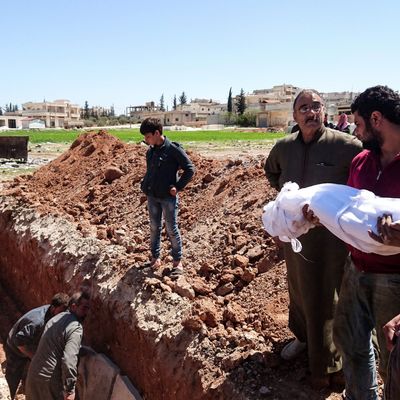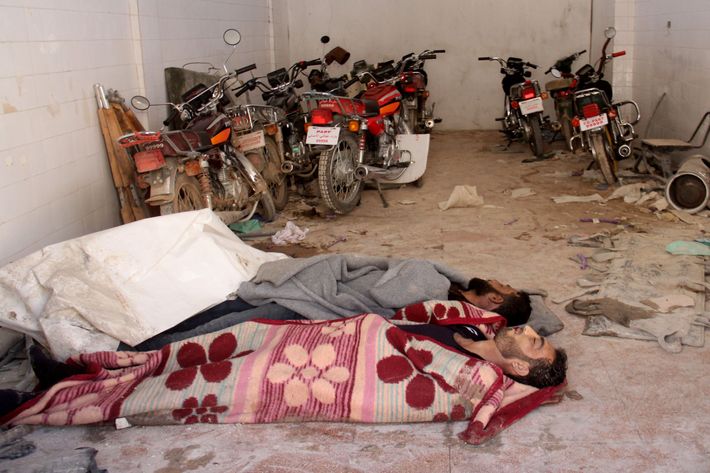
A toxic gas has killed at least 70 people, including 20 children, after an alleged chemical-weapons attack Tuesday in Idlib province in northern Syria. More than 100 remain hospitalized. Activists and Western governments, including the United States, have blamed President Bashar al-Assad for showering the deadly nerve agent, likely sarin, on his people, a horrific act the strongman leader has been accused of before, in 2013, in Ghouta.
Russia defended its ally, saying that the chemicals that choked dozens to death and injured scores had leaked from a Syrian-rebel stockpile in the ground. Assad, Moscow said, was not to blame, and Russia would not abandon him.

The Kremlin’s explanation has been roundly rejected. Hamish de Bretton-Gordon, director of Doctors Under Fire, told BBC4 that the claim was “fanciful.” “No doubt the Russians trying to protect their allies,” he said. “Axiomatically, if you blow up sarin, you destroy it.” Rebel commanders have also categorically denied having such capabilities. Witnesses also say the clinics treating the injured were later hit by air strikes.
Experts say that victims’ symptoms are consistent with sarin poisoning — foaming at the mouth, pinpointed pupils. The United States and Moscow brokered a deal after Assad’s sarin attack in Ghouta to have the Syrian leader turn over his chemical-weapons stockpile. Suspicions have long remained that the dictator did not fully comply; Assad has also continued to use chlorine gas in the six-year civil war.
The United Nations Security Council will hold an emergency session this afternoon, setting up one of the first big showdowns between the United States and Russia. The United States, the United Kingdom, and France have drafted a resolution that pins the blame on Assad and demands an investigation; Russia is likely to stick to its rebel line, says Reuters, and will use its veto power to protect its ally.
The White House blamed the previous administration’s “weakness” and failure to adhere to its “red line” for Assad’s latest chemical weapons. But this is now the Trump administration’s problem, and the White House is about to find out firsthand how knotty and fraught the Syrian situation is. Last week, United Nations Ambassador Nikki Haley said that removing Assad from power was “no longer a priority,” a sentiment echoed by Secretary of State Rex Tillerson. This had effectively been U.S. policy in practice — though never in name — for many months, based on the reality on the ground in Syria: Assad, bolstered by the Kremlin, had consolidated his grip on power in the six-year civil war, and any U.S. attempt to oust him would have set up a conflict with Moscow. Yet, Assad’s blatant and inarguable violation of human rights — even Trump called it a “heinous act” — could also be seen as a challenge to the United States, a test to see whether the White House will let the Assad regime, and Russia as its enabler, act with impunity.





























